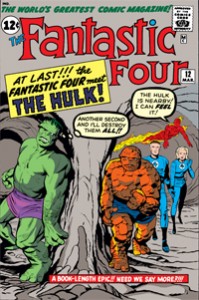Life Lessons from the Jeremy Manual of Style
 Hulk vs. Thing was existentially explored first back in 1963 in the March 12 issue of Fantastic Four. (c) Marvel Comics, Inc. Hulk vs. Thing was existentially explored first back in 1963 in the March 12 issue of Fantastic Four. (c) Marvel Comics, Inc. Thing vs. Hulk—who wins? Answer: Jeremy. Every six year old boy wrestled with this juvenile theodicy in 1975, and while we didn’t exactly know why it mattered, it mattered. A lot. In 1975, we didn’t have to care about who would win in Vietnam or New Orleans (Steelers beat the Vikings, 16-6) so we had the personal margin to do what the world otherwise overlooked—ponder the massive implications over who would win the battle of Green v. Orange. 40 years later, I can’t quite recall all those implications, but oh, they were there, and since Hulk and Thing were not there to defend their honor, it was up to us. Physically duking it out would get us in trouble, so we opted for the next best test of Truth by dickering over who was/not an idiot, whose dad could theoretically beat up whose dad, and why the metal embossing on Ricky’s lunch box was not admissible evidence because it clearly contradicted the most reliable, recent edition of the Fantastic Four comic book.
It took more work than I thought would be necessary to prove the no-duh obvious—the Hulk has no equal. If you honestly chronicle and contrast the accomplishments that Stan Lee credited to Hulk and Thing, the green guy was stronger, faster, bigger, and hoppier than Thing. (Hulk didn’t seem very quick on his feet, but he could hop around the world when he needed a break from smashing it). One kid, however, had a different take on the matter. I can’t remember his name, but I’ll call him Jeremy. He chimed in: “Thing will be Thing forever, but when Hulk calms down, he turns back into Bruce Banner. Thing wins.” I am sure that I did not concede defeat there, but Jeremy's point clobbered my smashing point. In fact, the truth is that I have channeled Jeremy's contrarian thinking into my work over the years. Today, when a client tells me, “I want to keep my voice retained in the work. I’m the author, you’re the ghost writer.” I ask back, “Does that mean your voice can’t improve?” Every author can improve. If you find yourself loving your written or spoken word a lot, consider taking a page from the Jeremy Manual of Style. Just when you think you’ve nailed something, ask somebody else if you’ve really nailed it. Maybe you have. Maybe you haven’t. We do well to welcome a disrupter into our work to challenge our assumptions and improve our thinking and improve our work. Sometimes, a project is obvious and there is no need for a contrarian. But pity the aspiring pastor or otherwise thought leader for dismissing the contrarian when he’s earnestly trying to point out that this particular moment could use some diverse thinking. This could be your Thing moment. ReSermon.com helps pastors repurpose sermon content into the public square though ghost blogging, social media engagement, book manuscript preparation and more. Click here for more information. © 2015 ReSermon.com. All rights reserved. |
Archives
January 2024
Categories
All
By David Fulmer from Pittsburgh (Natural American Sign Language) [CC BY 2.0], via Wikimedia Commons
By Jeff Billings [CC BY-SA 3.0], via Wikimedia Commons
By English: Cpl Erik Villagran [Public domain], via Wikimedia Commons
"Hearing aid 20080620" by Jonas Bergsten - Own work. Licensed under Public Domain via Wikimedia Commons.
|



 RSS Feed
RSS Feed